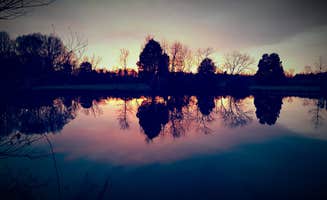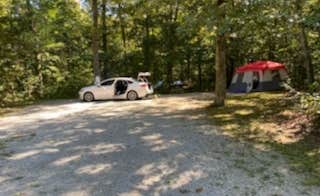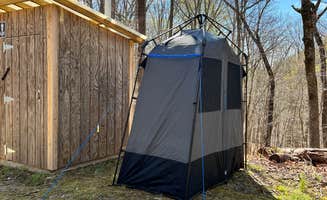Dispersed camping areas near Johnston City, Illinois offer primitive sites throughout the Shawnee National Forest, with most locations situated at elevations between 400-600 feet. The region features a humid subtropical climate with seasonal temperature variations ranging from 20°F in winter to 90°F in summer. Forest roads leading to rustic campsites typically narrow to single lanes with uneven surfaces, requiring cautious navigation during wet weather.
What to do
Explore rock formations: Jackson Falls features numerous climbing opportunities with challenging sandstone terrain. "The place is beautiful; forests and great big, moss covered boulders. It was fun climbing down to the bottom of the falls, even with small kids," shares one visitor who noted that even during dry periods when the falls aren't flowing, the area remains enjoyable.
Fishing opportunities: Dutchman Lake Camp provides accessible fishing spots with minimal hiking required. A camper reported, "Great little spot right off the interstate. Lots of nice scenery and decent fishing." The lake supports multiple species including bass and bluegill, with shoreline access available at multiple points.
Historical exploration: Take a short drive to examine nearby historical sites from Lake Glendale. "There are several historical sites in area. Illinois Iron Forge, Garden of the Gods, and segments of the Trail of Tears," notes a visitor who found these locations within reasonable driving distance of their campsite.
What campers like
Solitude during weekdays: Lake Glendale Recreation Area offers more peaceful camping experiences on non-weekend days. "Campground was not crowded during the weekdays. Nice shaded sites w electric and water hookups," reports one camper who paid $19 per night with a Senior Pass.
Easy forest access: Rustic camping near Johnston City provides direct trail connections from many sites. At Trail of Tears State Forest, campers appreciate the balance of convenience and seclusion. "Excellent for tent camping when you want relatively easy access and still feel a bit of solitude," states one forest visitor.
Connectivity at select sites: While cell service is limited throughout the region, certain locations maintain usable signals. At Dutchman Lake Camp, one camper noted, "Beautiful little spots as you come in. Quiet and easy to get too. Verizon works well," which can be important for those needing to stay connected.
What you should know
Road conditions vary significantly: Access to Dispersed Campsite Shawnee National Forest and other sites requires navigating forest roads that deteriorate after rain. "Love this spot! It's easily accessible by all rig types. Backs up to the open forest and you pull right back onto the highway," mentions one camper about a rare site with straightforward access.
Water crossings: Many primitive sites involve crossing shallow streams. At Jackson Falls, a camper observed, "There was a shallow creek crossing right before the camping areas that I was worried about when I arrived at night, but I realized in the morning that it was not a big deal even for 2WD vehicles."
Seasonal water availability: During dry periods, both waterfalls and drinking water sources may be unavailable. "We went during a dry spell and there was no running water at the falls! Still had a blast there though!" reports a Jackson Falls visitor, highlighting the importance of bringing sufficient water supplies.
Tips for camping with families
Best locations for children: Jackson Falls offers engaging activities for kids despite challenging terrain. A family noted, "The site is popular and there was a good amount of people on Labor Day weekend, however secluded camp sites were easy to find, isolation was achieved."
Playground access: For families wanting developed amenities, Lake Glendale provides structured play areas. "The kids love the playground, and there is SO much shade! The campsites are pretty private and some of them are nice and large," reports a regular visitor.
Wildlife awareness: Prepare children for encounters with forest wildlife. Many campers report ticks and poison ivy throughout the region, requiring regular checks and appropriate clothing coverage, especially during spring and summer months.
Tips from RVers
Site selection priorities: For RVs, finding level parking requires advance planning. At Panther Den Wilderness, road access narrows significantly, making larger vehicles difficult to maneuver through the tighter sections of forest roads.
Water crossing assessment: RV drivers should evaluate water crossings before attempting passage. One Jackson Falls camper with experience noted, "We run a 28ft RV and we're able to cross the first water wash without problem. We are a Jeep family so I may have more experience than others in off-roading."
Alternative parking strategies: When uncertain about road conditions, consider parking at main lots. "We opted to turn around and stay at the main parking lot which is VERY accessible. The further sights will require crossing several wash outs," advises an RVer who found safer options rather than risking difficult terrain.




